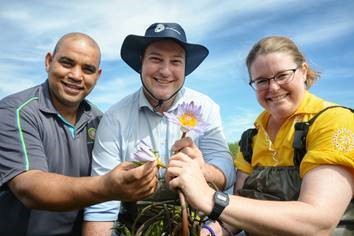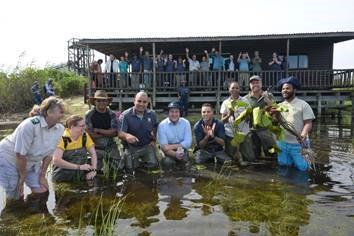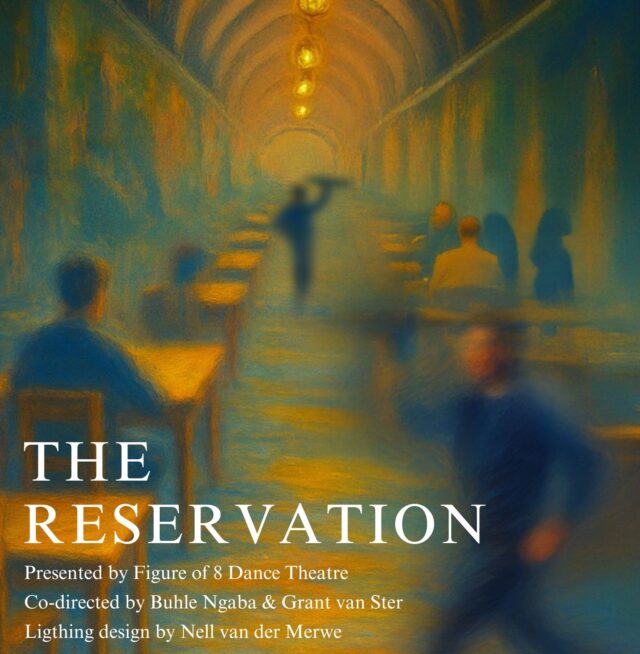The Cape Water Lily (Nymphaea nouchali var. caerulea) at False Bay Nature Reserve was reintroduced by Mayor Geordin Hill-Lewis at the culmination of the prestigious Earthshot Week in Cape Town.
The False Bay Nature Reserve: Rondevlei section is a Ramsar site of wetland significance. It was commonly observed in lowland wetlands on the Cape Flats until the mid-1900s. The flower is being restored to the Cape Flats to commemorate the first time the Earthshot Prize is hosted on the African continent.
‘This lily is in many ways a symbol of the legacy Earthshot leaves in our city – giving recognition to local climate and conservation heroes and helping them scale their work so that it can make a big impact. We can now affectionately refer to it as the Earthshot Lily. To commemorate Cape Town hosting the Earthshot Prize, we are proud to announce that the City of Cape Town is reintroducing the Cape Water Lily to wetlands on the Cape Flats. A site has been selected in False Bay Nature Reserve: Rondevlei section, which is managed by the Biodiversity Management Branch. Residents of Cape Town will be able to view the Cape Water Lily as they re-establish in our free-access nature reserve,’ said Mayor Geordin Hill-Lewis.
‘This further supports the City of Cape Town’s international obligations towards biodiversity conservation as a Ramsar City Wetland, and a role model city in the UN decade of ecosystem restoration,’ added Hill-Lewis.
Biodiversity importance of the Cape Water Lily
The Cape Water Lily would have been a significant part of Cape Town’s landscape and natural heritage in recent history. The Cape Water Lily receives special mention in ‘The official handbook of the City of Cape Town’ (1909), which was published by the Corporation of the City of Cape Town.

Conservation photographer Filipa Domingues hands over a special photo print of the Cape Water Lily to Mayor Geordin Hill-Lewis
‘The Cape Flats presents us with many showy flowers, such as numerous terrestrial orchids, Gladiolii, Heaths, etc. and the blue water lily, which makes such a show in the vleis (ponds) should certainly be seen when in season.
‘This species became locally extinct on the Cape Flats due to the pressures of habitat loss, pollution, augmentation as well as historical harvesting for the cut flower trade. The Cape Water Lily is a far-ranging and common aquatic plant species. It occurs in different wetland habitats in Southern Africa such as slow moving rivers, small ponds, and shallow vleis.
‘Restoring this culturally significant water lily to the Cape Flats is a symbol of our commitment to wetland conservation in Cape Town. Future generations will now be able to see the Cape Water Lily in its natural habitat. This species will enhance the wetland ecosystem where it occurs and will support many other important species,’ said Cllr Alex Lansdowne, Deputy Chairperson of the Advisory Committee: Water Quality in Wetlands, Waterways and the Coastal Environment.
Founded by Prince William in 2020, The Earthshot Prize has become a powerful global search engine for unearthing the world’s most innovative climate and environmental solutions. This is the first time The Earthshot Prize annual celebration is held in South Africa, following events in London in 2021, Boston in 2022, and Singapore in 2023.
Cape Town is the most biodiverse City in the world. Of the 20 vegetation types that occur in Cape Town, 11 are Critically Endangered and seven occur nowhere else. Our biodiversity is our natural heritage and it is unique and irreplaceable. The nature reserve network helps make our city sustainable and resilient through the ecosystem services provided by nature.
WHAT: Locally extinct Cape Water Lily back in bloom
WHERE: False Bay Nature Reserve: Rondevlei section, ERF1834 Fishermans Walk, Zeekoei Vlei, Cape Town, 7941
WHEN: November 2024 – Earthshot Week
INFO: Cape Town Green Map – False Bay Nature Reserve: Rondevlei section |
LEAD PHOTO: Deputy Mayor Eddie Andrews, Mayor Geordin Hill-Lewis and Earthshot Prize Trustee Zoe Ware before planting the Cape Water Lily.







